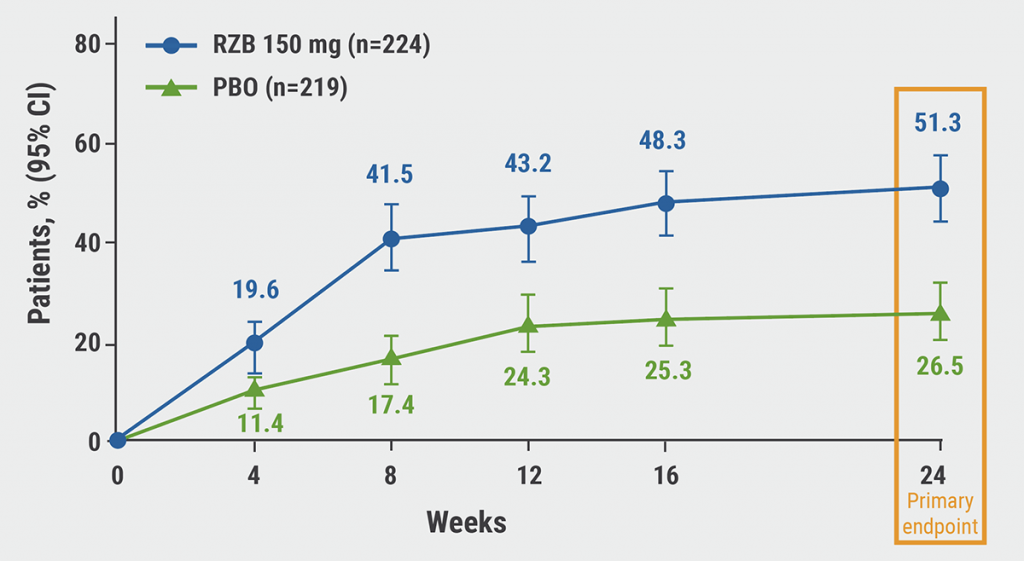Prof. April Armstrong (Keck School of Medicine at UCLA, CA, USA) pointed out that deucravacitinib is a novel oral selective tyrosine kinase 2 (TYK2) inhibitor with a unique mechanism of action distinct from Janus Kinase inhibitors [1]. Deucravacitinib binds selectively to the TYK2 regulatory domain, thus inhibiting TYK2-mediated signalling of cytokines involved in psoriasis pathogenesis, such as IL-23, IL-12, and type-1 interferon.
The efficacy and safety of deucravacitinib were assessed in 2 global phase 3 studies, the POETYK PSO-1 (NCT03624127) and the POETYK PSO-2 (NCT03611751). Both studies included patients with moderate-to-severe psoriasis. In POETYK PSO-1, in contrast to POETYK PSO-2, patients from Asian countries including China were enrolled.
Patients were treated with deucravacitinib, the currently available treatment apremilast, or placebo. In both trials, the co-primary endpoints were the percentage of patients achieving Psoriasis Area and Severity Index (PASI) 75 and the percentage of patients achieving static Physician's Global Assessment (sPGA) score of 0 or 1 (i.e. clear or almost clear skin) at week 16 versus placebo. After this time, placebo patients, as well as patients who failed apremilast, were switched to deucravacitinib and all patients were treated to week 52 (secondary endpoint).
At week 16, significantly greater proportions of patients in the deucravacitinib compared with placebo and apremilast arms achieved PASI 75. Similarly, a greater proportion of patients in the deucravacitinib compared with placebo and apremilast arms gained sPGA 0/1 at week 16 in both trials. The selective TYK2 inhibitor was also superior to apremilast at week 24 in both trials. Of deucravacitinib-treated patients who achieved PASI 75 at week 24, 82.5% in POETYK PSO-1 and 81.4% in POETYK PSO-2 continued treatment and maintained their PASI 75 response at week 52.
“Deucravacitinib was also better in multiple secondary endpoints,” Prof. Armstrong said. Significantly more patients in the deucravacitinib arms achieved a quality of life no longer impeded by the disease (corresponding to a score of 0/1 in the Dermatology Life Quality Index). The TYK2 inhibitor also improved symptoms of psoriasis such as burning, itch, and pain. After 16 weeks, 70.8% of patients in the POETYK PSO-1 trial achieved complete or almost complete clearance of their scalp lesions, compared with 39.1% in the apremilast arm and 17.4% in the placebo arm.
The most common adverse events were nasal pharyngitis and headache. “As in previous studies, there was a mild signal for folliculitis,” Prof. Armstrong added. However, cases were mild to moderate, and only 1 patient with folliculitis discontinued deucravacitinib treatment.
- Armstrong A, et al. Efficacy and safety of deucravacitinib, an oral, selective tyrosine kinase 2 (TYK2) inhibitor, compared with placebo and apremilast in moderate to severe plaque psoriasis: Results from the phase 3 POETYK PSO-1 study. Session S033, AAD VMX 2021, 23-25 April.
Copyright ©2021 Medicom Medical Publishers
Posted on
Previous Article
« Bruton’s tyrosine kinase inhibition promising for pemphigus vulgaris Next Article
Meaningful amelioration of quality of life in paediatric AD patients on dupilumab »
« Bruton’s tyrosine kinase inhibition promising for pemphigus vulgaris Next Article
Meaningful amelioration of quality of life in paediatric AD patients on dupilumab »
Table of Contents: AAD 2021
Featured articles
Letter from the Editor
Late-Breaking Abstracts
Small molecule effective in moderate-to-severe psoriasis
Bruton’s tyrosine kinase inhibition promising for pemphigus vulgaris
Bimekizumab superior to secukinumab in psoriasis
Etrasimod – a new mode of action for treatment of atopic dermatitis
Women at higher risk for dermatologic side effects during immunotherapy
Novel easy-to-use foam formulation clears scalp psoriasis in one-third of patients
Anti-cholinergic gel demonstrates superior long-term tolerability and efficacy in axillary hyperhidrosis
Psoriasis – The Beat Goes On
Psoriasis: The treatment armamentarium continues to grow
Psoriasis management in times of COVID-19: the knowledge is growing steadily
Lower burden of high-risk atherosclerotic plaques in psoriasis patients treated with biologics
COVID-19: What Dermatologists Need to Know
Psoriasis and hidradenitis suppurativa during COVID-19: keep calm and carry on
COVID-19 in children – cutaneous involvement is common
Cutaneous reactions after COVID-19 vaccination: an update
Novel Developments in Sun Protection
Sunless tanning and other developments in sun protection
What Is Hot in Atopic Dermatitis
Comorbidity is common in adult and paediatric atopic dermatitis patients
Significant improvements in the system armamentarium for AD treatment
Topical pan-JAK inhibitor cream safe and efficacious in atopic dermatitis
Hairy Matters – What Is New in Alopecia
Allergies: an underrated factor in alopecia pathogenesis
Botulinum toxin A: a contradictory role in hair loss
Platelet-rich plasma in androgenetic alopecia – hype or hope?
Acne – New Developments
New therapeutic options add value to current acne treatment
Nicotinamide and probiotics can support acne therapy
Pearls of the Posters
Related Articles
September 17, 2021
Vaccination feasible in people with psoriatic disease

© 2024 Medicom Medical Publishers. All rights reserved. Terms and Conditions | Privacy Policy
HEAD OFFICE
Laarderhoogtweg 25
1101 EB Amsterdam
The Netherlands
T: +31 85 4012 560
E: publishers@medicom-publishers.com

